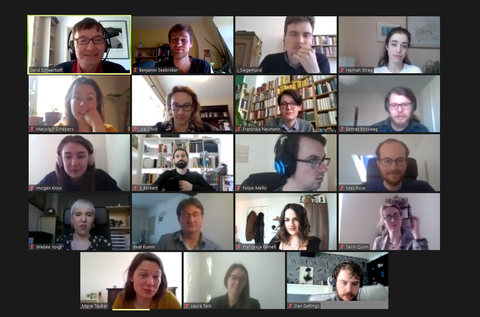15.05.2021
Workshop report - Media and Public (Dis)Order: A Workshop for early modernists at Dresden and Warwick
Media and Public (Dis)Order: A virtual workshop for early modernists at Dresden & Warwick
Held on Blackboard Collaborate, 29-30 March 2021
Co-organized by Maria Tauber (Warwick), Jan Siegemund (Dresden) & Benjamin Seebröker (Dresden)
The digital workshop stands in the 20-year-old tradition of exchange between postgraduate researchers of early modern history from the Technische Universität Dresden and the University of Warwick – this time complemented by participants from the University of Rostock.
Its aim was to bring together early career researchers from both sides of the channel to compare current historiographical trends in theories and methods. All presentations were broadly connected to the topic of ‘Media and Public (Dis)Order’, encompassing different periods of time, regional areas and contexts.
Over the course of the two-day workshop, the entire Early Modern era was covered, from the 15th to the beginning of the 19th century, and the topics ranged from the relationship between religion and state, print media, material culture to community politics. The workshop followed an open concept of media which incorporates oral, written and symbolic forms of communication – including everything from ceremonies to printed books.
Introductory papers, short presentations and discussions led to a lively exchange. The comparison of the projects as well as the discussions showed the very ambiguous relationship between media and public order. On the one hand, media could threaten the public order – the most prominent example being the reformation as a movement for which the use of the new print media was of great importance. As the reformation is extensively researched in Germany, this particular perspective on media as an agent of change appears more prominent on the continent. On the other hand, print media could be used by authorities to help maintain the public order. Moreover, forms of media commonly regarded as disturbers of peace and good order, like libels and pamphlets, could, from the perspective of their producers, be seen as means to criticise wrongdoings of authorities and thereby (re)construct social order.
The changing of the media landscape was a prominent topic throughout the presentations and discussions. Interestingly, lines of tradition were also highlighted, mostly concerning the persistent importance of ‘older’ forms of media, such as manuscripts, which, despite the availability of print, were still widely used to shape public opinion. In some cases, the emergence of print media even stimulated the production of more traditional media.
The rich discussions showed how research on media and public communication is influenced by the availability of primary sources, which in some cases differs between the UK and Germany. Another difference between the two historiographic traditions lies in the debate about the emergence of the ‘public sphere’. Here, a longstanding, partly exhausted discussion in Germany faces a comparatively new one in the UK.
At the end of the digital workshop, participants expressed their wish to continue the cooperation and meet in person once safe international travel resumes.
See the full workshop report by Imogen Knox & Felipe Mello published on HSozKult

